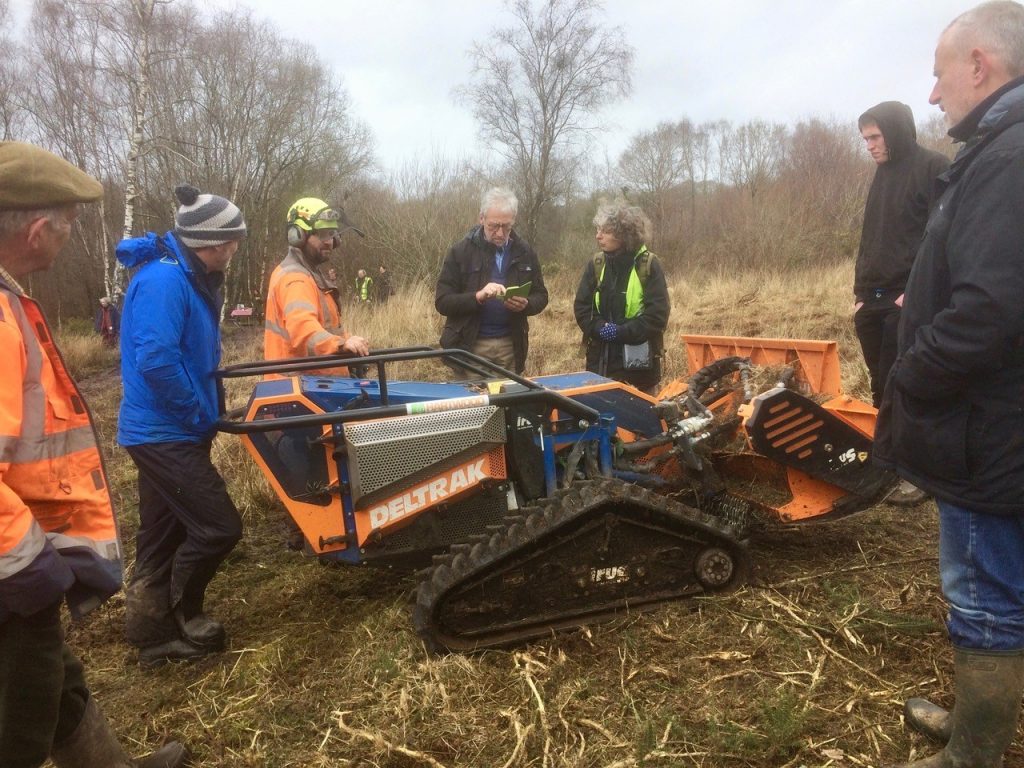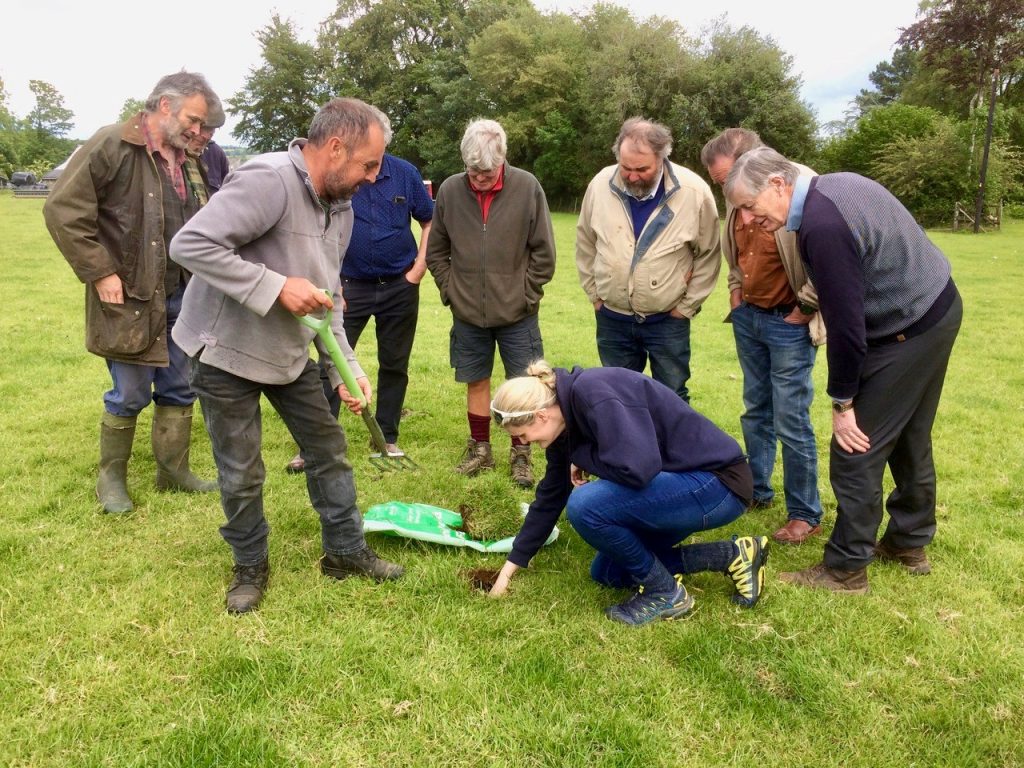A problem shared…
Farming in the Blackdown Hills is challenging – physically, financially, agriculturally and environmentally. We have a wonderful landscape, but it is not an easy one to make a living from, and maintaining its beauty and richness requires lots of knowledge and experience. Farmers have always had to battle with the elements to wrest a harvest from the hills, but that battle is becoming more testing as the years go by, as the climate becomes more unpredictable and extreme.

Farmers discussing machinery for scrub control. Photo: Gavin Saunders
Added to those challenges, the basic raw material of farming – the soil – is becoming less dependable. Intensive farming can put enormous and unsustainable pressures on our soils, which an extreme climate then exacerbates. When farming operations using heavy equipment must take place in wetter months of the year, soils become compacted, losing their health and their ability to absorb rain. When crops like maize, required to feed expanded herds, are grown on sloping land close to watercourses, the exposed soils are vulnerable to erosion when heavy rain follows periods of drought. And when traditional rotations give way to periods of sustained heavy stocking, soils become poached and lose their structure. These pressures on soils are driven by the relentless pressures of markets, which drive farmers to try and extract more from the land than our fragile hillsides can really provide.
Wildlife habitats are still relatively plentiful in the Blackdown Hills landscape, with remnants of flower-rich springline mires, meadows and heaths holding on, thanks to the efforts of farmers to retain a place for them in their operations. And our landscape is still defined by the network of hedges and copses which frame the fields. Wildlife habitats don’t generally yield a profit, so their management has been dependent for many years on agri-environment grants from government. Those grants have always presented their own set of bureaucratic challenges, and as we leave the EU they are set to undergo a massive change. The current area-based payments to landowners will be phased out over the next five years, and in their place, public funding for farmed land will only reward the provision of ‘public goods’ by farmers – clean air, clean and plentiful water, thriving wildlife habitats, reduced risk from environmental hazards, enhanced natural beauty, and mitigation against climate change.
Against this daunting backdrop, farmers need continually to keep their knowledge up to date and learn from others’ experience. Given the day-to-day pressures of farming, there is little time in practice for that self-development, but it is not all about cutting edge, high-tech know-how. Some of the most valuable ‘training’ in land management can come from an informal chat with other local farmers, sharing experience and learning about what works and what doesn’t. And much of that collective knowledge is not new – it’s as old as the hills.
The Blackdown Hills Farming and Woodland Group is one of over 100 Facilitation Fund networks across England, funded by Natural England but run by a local partnership with farmers at its heart. The Blackdown Hills group encourages collaborative information exchange between landowners, in order to promote better environmental practice, and has been running for over two years, with a membership now standing at 85 land holdings ranging from large estate owners, through commercial livestock farms to smallholders and woodland owners. Nearly 40 training and experience-sharing events to date have encompassed a wide range of subjects from earthworms and healthy soils, insect pollinators, farmland butterflies and woodland management, to scrub machinery demonstration, veterinary issues on wet land, farm carbon auditing and hedgerow management. And while the pandemic necessarily brought a temporary halt to face-to-face events in March, we have continued to run training via video conference.

Farmers doing soil tests for earthworm activity. Photo: Gavin Saunders
The largest event organised by the group was a conference on Climate Change and Farming in the Blackdown Hills, which took place at Monks Yard in November 2019. This brought together issues surrounding soil conservation, flood management, pasture farming and woodland management, in the context of a changing climate. The conference was addressed by Prof Richard Betts, head of climate impacts strategy at the Met Office, and a lead author for the IPCC’s 4th Assessment Report. Other speakers included Mhari Barnes from the NFU and soils expert Dr Richard Smith from the Environment Agency. The audience of 70 undertook a series of workshop sessions which helped identify priorities for the Blackdown Hills farming community in adapting to and helping tackle climate breakdown which is already affecting our area.
Meanwhile in a parallel project, the Blackdown Hills is running one of a national series of tests and trials to inform the development of the new Environmental Land Management (ELM) scheme, which will replace current farm payments in a few years’ time. Again, the principle we are following in that trial is to enable farmers to talk to one another, so they can assess what their environmental challenges and responsibilities are in their own landscape, and feed back to Government on what form of financial support will be needed to help them meet those challenges.
They say that a problem shared is a problem halved, and in these uncertain times there’s an even greater need for farmers, like the rest of our communities, to share, listen, hear, help – and sustain their livelihoods and their landscape into the future.





